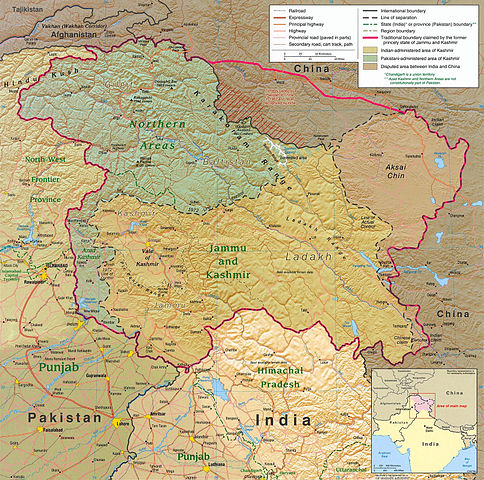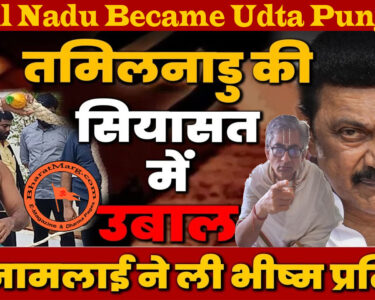In ancient India, there was a Vedic seer named Kashyapa, who according to the legends, arrived in a beautiful Himalayan valley in northern India, defeated the demonic serpents who inhabited therein, and created a beautiful lake with the help of a local devi Sati. In time, after his name, the beautiful valley came to be known as Kashmir. But today, the Muslim-majority Kashmir valley is infamous for another reason. Some call it oppression and atrocities by the Indian state, some call it Islamic terrorism, but whatever it is, it has been burning the Valley for decades. The Pakistani side of this narrative, which many in the leftist international media also keep parroting, is that the Kashmiri people (read, Kashmiri Muslims) have been fighting for “freedom” against the Indian occupation, for a referendum and the right of self-determination. So, is the Kashmir problem so simple, or is something important being ignored deep down so as to make it look simple?
What most people don’t know is that the accession of the state of Jammu and Kashmir to India took place in accordance with the Right of Self-Determination of the Kashmiris (and other peoples in the state), through representative democracy. Yes, it is true that the Indian Independence Act of 1947, which formed the basis of Partition and Independence, gave the right of accession to either India or Pakistan or independence to the rulers (Maharajas, i.e. princes) of the princedoms. The Act did not specify any referendum conditions for princedoms. The only places the referendums were mandated to take place were the North-West Frontier Province and the Sylhet district of Assam, which were British-governed provinces. So, the Instrument of Accession signed by the Maharaja of Jammu & Kashmir, Maharaja Hari Singh, was necessary and sufficient for the legality of the accession to India. This took place in October 1947 following which India legally sent its Army to the state to push back the marauding Islamic lashkars and Pakistani soldiers-in-disguise.
Well, one might say, in this age of democracy, with India being democratic, were the wishes of the people of Kashmir (which is Muslim-majority) simply forgotten? Again, the answer is no. Both Congress (Indian side) and Muslim League (Pakistan side) had talked about the fate of the princely states while discussing the Indian Independence Bill. The Indian side wanted referendums to be held in the princely states, but the Muslim League wanted the princes to make the final and unrestricted choice of accession. The reason behind this was the desire of Jinnah, the founder of Pakistan, to obtain the princedom of Deccan in South India, which was Hindu majority and had with a Muslim ruler. The Nizamate of Deccan i.e. Hyderabad, was extremely important to Pakistan because the Nizam was exceedingly rich, and had a priceless collection of fabulous jewels. And Pakistan would need the money to survive as a new state. That is why no referendum provision was mentioned in writing in the Indian Independence Act.
Even before the accession of J&K to India, the near-unanimous leader of Kashmiri Muslims, Sheikh Abdullah, and his party the National Conference, had recommended the state’s accession to India (whether one likes or hates Sheikh Abdullah, it is another story, but facts cannot be denied). Then came the Nehruvian blunder, which most people know, of taking the Kashmir issue to the United Nations, so that “peace” may be achieved at all costs. True, the United Nations, under Chapter VI of its Charter, recommended a referendum/ plebiscite to be held in Jammu & Kashmir, provided that Pakistan vacate the territory it had occupied during its raids (Gilgit-Baltistan and so-called Azad Kashmir). Pakistan under once wishy-washy excuse or another, refused to do so, and so India never held the recommended referendum.
Now comes the part where the tactic of Lying by Omission is used. Since Pakistan never vacated its occupied territory, Sheikh Abdullah and the National Conference recommended the formation of the state Constituent Assembly. A democratically elected Constituent Assembly for the state was formed in 1951. This Assembly in 1956 unanimously ratified the state’s accession to India as final and irreversible. So, the right of self-determination was given to the Kashmiri people in 1956, which went in the favor of India; the only thing here is that it was exercised through representative democracy and not through direct democracy. Now it is a separate and long discussion that whether direct democracy is better of representative democracy. But considering that Kashmir is not purely Muslim, there are also 10 % Hindu minority and then Shiite Muslims as well, and then the Dogras, Gujjar and Ladhakhis in the other parts of the state, one might ask the question: is it fair for two wolves and one lamb to decide through a referendum what they would have for dinner?




